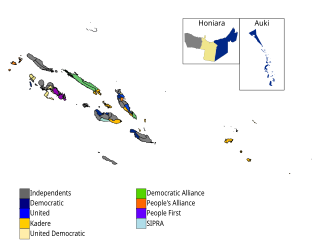
Politics of Solomon Islands takes place within the framework of a parliamentary representative democratic, constitutional monarchy. Solomon Islands is an independent Commonwealth realm, where executive power is exercised by the government. Legislative power is vested in both the government and a multi-party parliament.

Allan Kemakeza was the prime minister of Solomon Islands from 2001 to 2006. He represented Savo/Russel Constituency in the National Parliament of Solomon Islands from 1989 to 2010 and was most recently Minister of Forestry December 2007 to August 2010. He served as Speaker of the National Parliament, from September 2010 to 2014.

Sir Peter Kenilorea was a Solomon Islander politician, officially styled The Rt Hon. Sir Peter Kenilorea as a member of the Privy Council of the United Kingdom. He was the first prime minister of an independent Solomon Islands, from 1978–1981, and also served a second term from 1984–1986.

The People's Alliance Party (PAP) is a political party in Solomon Islands.

Bartholomew (Bart) Ulufa'alu CMG was the prime minister of Solomon Islands from 27 August 1997 to 30 June 2000.

General elections were held in the Solomon Islands on 5 April 2006. No party won more than four of the fifty seats, while thirty seats went to independent candidates. A number of those subsequently formed an Association of Independent Members of Parliament, with Snyder Rini as their leader. Rini was elected Prime Minister by Parliament on 18 April, amidst "widespread street protests" in Honiara, which caused particular damage in the city's Chinatown. Rioters "alleged corruption and insisted that Mr. Rini had been unfairly favouring Chinese businessmen". While the riots ceased with the arrival of Australian and New Zealand peacekeeping troops the next day, the opposition soon lodged a motion of no confidence in Rini's premiership. Rini resigned on 26 April, having been Prime Minister for just eight days. Opposition parties united in a coalition and succeeded in having Manasseh Sogavare, of the Solomon Islands Social Credit Party, elected Prime Minister on 4 May.
Edward Huni'ehu was a Solomon Islands politician.

Gordon Darcy Lilo is a Solomon Islander politician who served as the prime minister of Solomon Islands from 16 November 2011 to 9 December 2014. He was a member of the National Parliament of the Solomon Islands, representing the Gizo/Kolombangara constituency spanning Gizo and the island of Kolombangara in Western Province. Lilo served as the Minister of Finance of the Solomon Islands from 2006 to 2007 and from 2010 to 2011.

General elections were held in the Cook Islands on 30 March 1978 to elect members of the Legislative Assembly. The result was a victory for the Cook Islands Party (CIP) of Premier Albert Henry, which won 15 of the 22 seats. The Democratic Party won the remaining seven seats.
East Honiara is a parliamentary constituency electing one representative to the National Parliament of Solomon Islands. With an electorate of 30,049 in 2006, it is by far the most heavily populated constituency in the country, being the only one to consist in more than 20,000 voters. It is one of three parliamentary constituencies in the country's capital city, Honiara - the other two being Central Honiara and West Honiara.

The Solomon Islands United Party (UP) is a political party in Solomon Islands.
Andrew Nori was a Solomon Islands lawyer and politician, arguably best known for his role in the ethnic conflict on Guadalcanal in the late 1990s and early 2000s.

General elections were held in the Solomon Islands on 22 June 1976. Although contested by three political parties, the Independent Group emerged as the largest group in the Legislative Assembly, and elected Peter Kenilorea Chief Minister.

General elections were held in the Solomon Islands on 24 October 1984. A total of 230 candidates contested the elections, the result of which was a victory for the Solomon Islands United Party, which won 13 of the 38 seats.

General elections were held in the Solomon Islands between 22 May and 12 June 1973. The following year, Solomon Mamaloni of the People's Progressive Party became the first Chief Minister.

General elections were held in the Solomon Islands for the first time on 7 April 1965.

The Independent Group (IG) is a political faction in the Solomon Islands comprising the independent members of the Solomon Islands Parliament.

General elections were held in Solomon Islands on 3 April 2019 to determine the composition of the 11th Parliament. The election was the first to occur since the conclusion of the Regional Assistance Mission to the Solomon Islands (RAMSI) in 2017. Parliament passed amendments to the electoral act in 2018 that included the introduction of pre-polling, a significant increase in campaign budgets for candidates and stricter penalties for individuals committing electoral offences such as vote-buying. Ten of the thirteen parties that contested the election won seats, and the Solomon Islands Democratic Party and the Kadere Party were the parties that secured the highest amount, winning eight each. However, as in previous elections, independent candidates won the largest share of seats, securing 21.
Emmanuel Tony Harihiru was a Solomon Islands politician. He served as a member of the National Parliament from 1980 until his death, and was Minister of Works and Public Utilities and Minister of National Economic Planning.

General elections were held in Solomon Islands on 17 April 2024 to determine the composition of the 12th Parliament. Initially planned for 2023, parliament voted in 2022 to delay the elections. Prime Minister Manasseh Sogavare claimed the country could not afford to have an election in the same year the Solomon Islands were hosting the Pacific Games. The opposition condemned the delay and accused Sogavare of a power grab.








